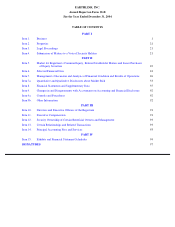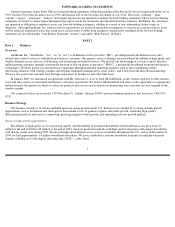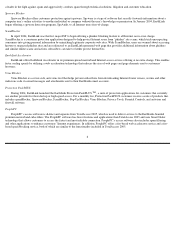Earthlink 2004 Annual Report Download - page 13
Download and view the complete annual report
Please find page 13 of the 2004 Earthlink annual report below. You can navigate through the pages in the report by either clicking on the pages listed below, or by using the keyword search tool below to find specific information within the annual report.
access cost per customer. As a result, we launched marketing efforts and began offering retail DSL services at a price of $39.95 per month in
select Verizon territories.
We have historically had wholesale relationships with Sprint and Charter Communications, Inc. (“Charter”).
In April 2004, EarthLink and
Sprint entered into an extended and revised wholesale broadband agreement pursuant to which the arrangement was extended for three years.
However, the new agreement provides for less average revenue per subscriber for us than previous levels.
In July 2003, we signed a new agreement with Charter pursuant to which we transitioned from providing wholesale broadband services to
Charter in certain markets to offering EarthLink Experience, a premium, add-on Internet service, to Charter subscribers in these markets for a
smaller monthly fee. The premium Internet service includes functionality available in our current retail premium narrowband and broadband
service offerings such as Pop-Up Blocker, spamBlocker and ScamBlocker.
The availability of and charges for last mile access with these and other last mile broadband network providers, including ILECs, CLECs
and cable providers, at the expiration of current terms cannot be assured. We cannot be certain of renewal or non-termination of our contracts
with our broadband providers. Our results of operations could be materially, adversely affected if we are unable to renew or extend contracts
with our current broadband network providers on acceptable terms.
Internet Taxation
The Internet Tax Non-Discrimination Act, which was passed by Congress in November 2004 and signed into law in December 2004,
renewed and extended until November 2007 a moratorium on taxes on Internet access and multiple, discriminatory taxes on electronic
commerce. This moratorium had previously expired in November 2003. As with the preceding Internet Tax Freedom Act, “grandfathered”
states which taxed Internet access prior to October 1998 may continue to do so. Certain states have enacted various taxes on Internet access
and/or electronic commerce, and selected states’ taxes are being contested on a variety of bases. However, state tax laws may not be
successfully contested, and future state and federal laws imposing taxes or other regulations on Internet access and electronic commerce may
arise, any of which could increase the cost of providing Internet services and could materially adversely affect our business.
Competition
We operate in the Internet services market, which is extremely competitive. Current and prospective competitors include many large
companies that have substantially greater market presence and greater financial, technical, marketing and other resources than we have. We
compete directly or indirectly with the following categories of companies:
•
established online services companies, such as Time Warner (AOL) and the Microsoft Network (MSN);
•
local and regional ISPs;
•
free or value-priced ISPs such as United Online;
•
national telecommunications companies, such as AT&T and MCI;
•
regional Bell operating companies, such as SBC, Verizon and BellSouth;
•
content companies, such as Yahoo!, who have expanded their service offerings;
•
cable television companies providing broadband access, including Comcast, Charter and Cox Communications, Inc.; and
10
























